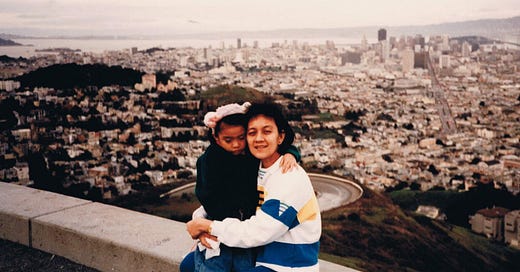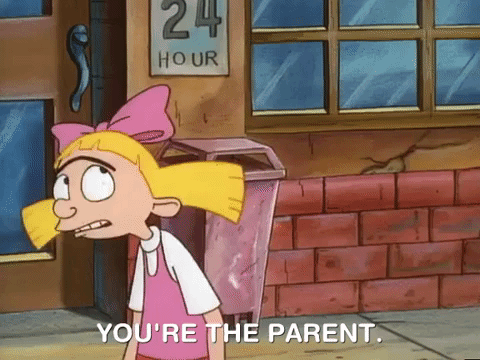OverFlow: Where I Can Go and Tell My Secrets To
That is to say: Right here. My secrets are hidden in plain sight, these days.
OverFlow is what happens when I overthink, overflow, and over-everything. When my feelings have nowhere to go, I write about them. Full disclosure: This is something I wrote on May 11, 2020 for Mother’s Day. Finding it difficult to dig deeper than I do when I write my Instagram captions about Christmases past — an idea I inexplicably thought was brilliant when I started it a few days ago. Hopefully, I get it together and write something new for next week. For now, please enjoy this essay that should have been a letter to my mom.
One of my mother’s favorite songs is “In My Room” by the Beach Boys — an introvert anthem if I ever heard one. In this world, I lock out all my worries and my fears: in my room.
While I’ve always been candid about my relationship with my father, I don’t talk about my mother a lot beyond the expected pleasantries. Joining a daily poetry challenge last month — you can find my contributions at my Instagram, tagged #decolonize30for30 — changed this in a very public and very permanent manner.
I didn’t expect to divulge that much information about my family. Not about my mother and my complicated feelings about how we communicate, anyway. There is no explicit mention of this in any of my poems from April, but there is — to me, at least — a distinct lack of spontaneity when it comes to sharing stories about her. When I read the 30 poems I’d written over the month, this observation surprised me.
Why do I empathize and connect more easily with stories involving my father?
Whenever I write about my mother, the process always feels contrived and curated.
Sometimes it seems cursed — like I’m violating a sacred oath of secrecy. Perhaps it is a reflection of the maternal emotional distance I felt as a child and found a name for only recently as an adult.
This is not meant to be an accusation or a complaint. Our mothers and fathers learn how to parent us from their mothers and fathers, and often they don’t realize when their actions have unhealthy consequences for their children. I get that. I have been re-parenting myself for more than a year now, and I’m past the stage of struggling to let go of blame.
What’s shocking to me is that I am, indisputably, the best communicator among my family — but communication issues form the bulk of what I deal with when I’m self-healing.
I can’t pick up the phone and ask to speak to my mother. Whenever we actually talk, it’s never hard and it’s never a chore. So why the difficulty? I never want to bother her in case she’s busy, even though she never, ever is — especially during these uncertain times. None of this makes sense, but it stops me in my tracks.
Growing up, my mother’s love language was comforting silence and acts of service.
It’s not that we didn’t talk. She was a very present parent, making sure to meet and greet everyone at the parties I threw at home. My friends love her and continue to tell stories of her cool dance moves and delicious dinners.
After socializing this way or even in between making lunch and dinner on ordinary days, she would retreat to her bedroom for long stretches at a time. Sometimes I would catch her just laying in bed and not doing anything. I would lie next to her quietly.
We were always together, but we never had deep conversations. I suspect it was because she wanted to protect me from anything that would be distressing or worrisome. It was a habit for her to carry the world on her shoulders.
Years later, it took many fights and painful talks with my husband for me to realize that I had internalized my mother’s love language as my own.
I never liked complaining or standing up for myself. I always put everyone else’s needs before mine. I never spent on anything that wasn’t necessary. I never wanted to talk about how I was drowning in sadness and depression and grief. I didn’t want to be a burden.
I didn’t want to be a receiver — always a giver.
How do I tell my mother: This is how the way you love impacted me. This is how it hurt me and threaded its way throughout my life. This is why I can’t call you up unless I’m literally crying and having an emotional breakdown in my bathtub.
What would my mother tell me if she didn’t excise uncomfortable truths? What would I tell her if I did the same?
How do I tell her the truth without making her feel like a bad mother? Because she did the best she could. She’s amazing. But I’m sad that her brand of caring came at a life-changing cost. I want to get to know the woman she was before she had to think about her family’s well-being before her own. Who was she? Would we have been friends?
It was Mother’s Day yesterday and I didn’t call her. Does she think I don’t love her the way I love my father? Does she understand how hard it is to admit vulnerability to someone that’s always appeared strong?
The next time we speak, will she still call me her baby girl?
How long do I have before it’s too late to get over old habits? Will I ever completely re-parent myself well enough to tell her everything without being scared of how she might feel?
All this to say: It is possible to have a mother you love that loves you back with all that she has, and still have a complicated relationship that you don’t know now how to fix. Good intentions don’t always translate into good actions. Wanting to build a connection isn’t the same as knowing how to do it.
When will my mother become a world where I can go and tell my secrets to? We’re at the edge of the apocalypse now, so I might as well find out.
If you’ve enjoyed reading this or something else I’ve written, please consider buying me a coffee. ☕ Thank you!







